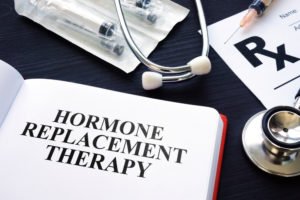
Results from hormone replacement therapy (HRT) will depend on several variables unique to a patient’s overall health.
These variables may depend on a patient’s:
- Rate of hormone loss
- The extent of treatment they require to regulate their hormone levels
- Their biological response to therapy
- Their expectations (or how they measure progress)
- The frequency of HRT sessions
- Any underlying health conditions that could affect their hormone levels
Health care is an individualized practice; generalizing how long it may take to see results from HRT may lead to inaccurate projections. Speaking with a HealthGAINS wellness provider may grant patients the opportunity to learn more about how soon they may expect results from hormone replacement therapy.
HRT Explained
HRT generally alludes to the process of replacing declined hormone levels. Deficits in three particular hormones (estrogen, testosterone, and progesterone) may be the reason for pursuing HRT.
These deficits may result from a few possible sources, including:
The Natural Aging Process
Getting older may cause numerous changes in the human body. Changes in the endocrine system may cause a decline in the hormone levels that are vital to peak performance. As the body ages, not only does the amount of hormones in one’s body decline, but the body may also undergo other changes. For instance, one may experience increased fat retention or diminished energy levels.
While the effects of aging may seem undesirable, there are many treatments that seek to remedy this process. Speaking with a HealthGAINS wellness advisor may grant a person more insight into what methods could restore their optimal performance.
Specific Medical Conditions
Hypopituitarism is just one condition that may affect a person’s hormone levels.
This condition could:
- Result in the diminished activity of the pituitary gland, which serves a critical role in hormone production
- Cause the human body to have lower hormone levels than it would under normal conditions
- Lead to medical issues, such as stunted growth or high blood pressure
Those who suffer from hypopituitarism may need treatment throughout their life and should consider HRT as an option that could help them.
Menopause
Menopause is a female-specific consequence of aging which may come at different ages for different women. It is marked by symptoms such as night sweats and hot flashes. HRT may be a way for women experiencing symptoms of menopause to diminish or eliminate those effects.
Undesirable Effects Associated with Low Hormone Levels
The goal of HRT is generally to restore one’s hormone levels. To understand why one may want to restore their hormone levels, one must first understand the effect that diminished hormone levels can have on a person’s wellbeing.
Deficiencies of estrogen, testosterone, and progesterone can have far-reaching effects on a person’s life.
The Effects of Low Hormone Production in Women
Progesterone is a female sex hormone that plays a valuable role in conception. Women who are trying to conceive may have greater difficulty doing so if they are not producing adequate amounts of progesterone.
Deficiencies in estrogen may also produce unwanted health issues.
However, HRT may be used to treat or prevent:
- Hot flashes
- Vaginal dryness
- Osteoporosis, or the loss of bone mass
- Vaginal itchiness
- Vaginal burning
The conditions associated with menopause may be extremely unpleasant, and increasing estrogen levels through HRT may prove to be an effective form of treatment.
The Effects of Low Hormone Production in Men
Having too little testosterone in one’s body could produce a unique set of consequences.
Low testosterone levels may lead to:
- Changes in mood, including but not limited to the development of depression
- A general sensation of being unwell
- Erectile dysfunction (ED)
- Loss of energy
- Loss of muscle
- The shedding of body hair
- Gaining weight
- Infertility
- The development of male breasts
It is not only men that may be affected negatively by having too little testosterone. Adults who believe that they are suffering from hormone-related health issues should speak to a HealthGAINS wellness advisor about their condition. Properly regulating one’s hormone levels could improve various aspects of their life.
A HealthGAINS wellness provider can also assist in planning and providing HRT. They can also explain when a person will start seeing results from hormone replacement therapy.
Contact a HealthGAINS Wellness Provider Today
A patient who is interested in learning more about HRT should consider what HealthGAINS can do for them. A HealthGAINS wellness provider will use prescription-grade hormones in any treatment that they provide.
To learn more, contact HealthGAINS today at (305) 682-1818.
- https://medlineplus.gov/ency/article/004000.htm
- https://www.mayoclinic.org/diseases-conditions/hypopituitarism/symptoms-causes/syc-20351645#:~:text=Hypopituitarism%20is%20a%20rare%20disorder,the%20base%20of%20your%20brain
- https://www.healthline.com/health-news/benefits-of-hormone-replacement-therapy
- https://www.healthline.com/health/womens-health/low-progesterone#low-progesterone
- https://medlineplus.gov/druginfo/meds/a682922.html
- https://my.clevelandclinic.org/health/diseases/15603-low-testosterone-male-hypogonadism




